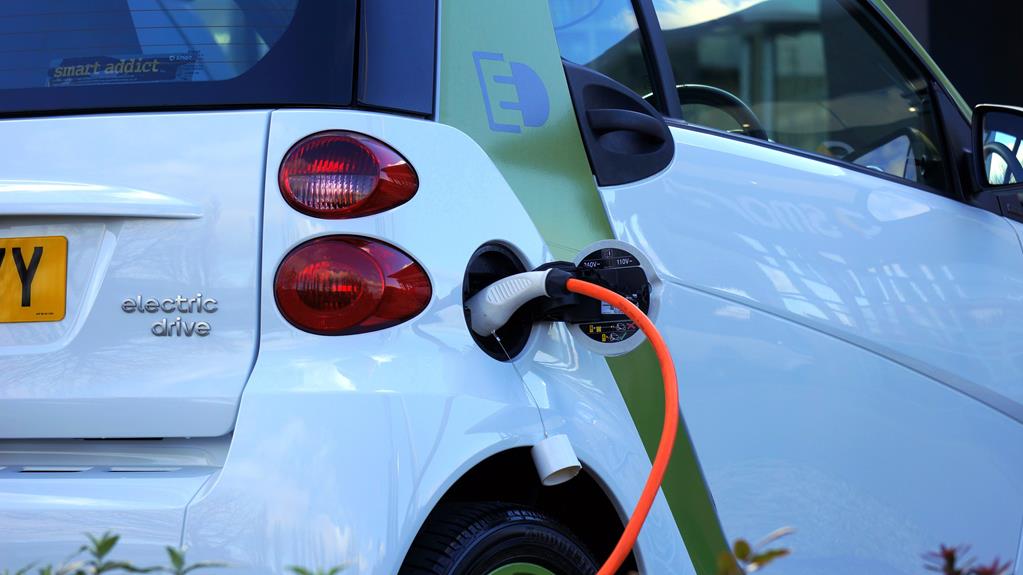Are you tired of dealing with car battery failures? Do you want to avoid the inconvenience and frustration of being stranded with a dead battery?
Well, here's an interesting statistic for you: Did you know that car battery failure is one of the leading causes of breakdowns on the road? But don't worry, we've got you covered!
In this article, we will guide you on how to avoid the risk of car battery failure and ensure a smooth and reliable start every time. From choosing the right battery to essential maintenance tips, we've got all the information you need to prevent those dreaded battery failures.
So, let's get started and make sure you never get stuck with a dead battery again!
Key Takeaways
- Use high-quality batteries for your car
- Avoid buying cheap car batteries
- Keep old batteries charged when not in use to prevent self-discharge
- Promptly address maintenance needs and repair any issues
Importance of Car Batteries
The car battery is crucial for ensuring your vehicle's engine operates smoothly and efficiently. It provides the electrical power needed to start the engine and keep it running. Without a properly functioning battery, your car may not start or may experience issues while driving.
The battery also helps power the car's electrical components, such as the lights, radio, and air conditioning. It acts as a backup power source when the alternator isn't generating enough electricity.
Additionally, the battery helps stabilize the voltage in the car's electrical system, preventing damage to sensitive electronic components. Regular maintenance and timely replacement of the battery are important to ensure optimal performance and avoid unexpected breakdowns.
Remember to choose a battery that's compatible with your car's make and model to ensure proper fit and functionality.
Types of Car Batteries
To understand the different options available, you should explore the various types of car batteries on the market.
The most common type is the lead-acid battery, which has been widely used in cars for years.
However, there are also newer options such as lithium-ion (LiOn) batteries, which are lighter, have longer lifespans, and provide higher amounts of electrical power.
Another option is the AGM (Absorbed Glass Mat) battery, an upgraded version of the lead-acid battery that eliminates the need for maintenance.
When choosing a new car battery, it's important to consider factors like your car's energy needs, make and model, and compatibility.
Factors to Consider Before Buying
Before purchasing a new car battery, it's important for you to consider several factors:
- Research and consider the type of battery that will best serve your car's needs. There are different types of batteries available, such as lead-acid, lithium-ion (LiOn), and AGM (Absorbed Glass Mat) batteries. Each type has its own advantages and disadvantages, so it's crucial to choose the one that suits your car's requirements.
- Know your car's make and model to determine the right battery. Different cars have different battery specifications, so it's essential to ensure compatibility.
- Consider the amount of energy the battery will serve. This depends on the electrical demands of your car and the driving conditions you often encounter.
Researching the Right Battery
When researching the right battery for your car, consider the specific electrical demands and driving conditions of your vehicle. To help you make an informed decision, here is a comparison table of different types of car batteries:
| Battery Type | Pros | Cons |
|---|---|---|
| Lead-Acid | Affordable, widely available | Heavy, shorter lifespan |
| Lithium-Ion | Lightweight, longer lifespan, high power | Expensive, limited availability |
| AGM | Maintenance-free, longer lifespan | Costly, limited availability |
Understanding the pros and cons of each type will enable you to choose the battery that best suits your car's needs. It's important to consider factors such as cost, weight, and lifespan. Additionally, evaluate the specific electrical demands of your vehicle and the driving conditions you typically encounter. By conducting thorough research, you can ensure that you select the right battery to avoid the risk of car battery failure.
Tips to Prevent Battery Failure
To prevent car battery failure, you should regularly maintain and monitor the condition of your battery. Here are three tips to help you prevent battery failure:
- Keep your battery terminals clean and free from corrosion. Corrosion can prevent proper electrical connections and reduce the battery's performance. Use a battery terminal cleaner and a wire brush to remove any buildup.
- Avoid leaving your car's electrical components on when the engine isn't running. This includes lights, radio, and other accessories. Leaving these components on for extended periods can drain the battery and shorten its lifespan.
- Test your battery regularly using a battery tester. This will help you identify any issues with the battery's charge or capacity. If the test results show a weak or failing battery, it's best to replace it before it completely fails.
Avoiding Cheap Car Batteries
You should avoid buying cheap car batteries to prevent the risk of car battery failure. Cheap car batteries are often made with low-quality materials and lack the necessary performance standards. These batteries may not provide sufficient power to start your car reliably, especially in extreme weather conditions.
They also tend to have shorter lifespans, requiring more frequent replacements. Cheap batteries are more prone to internal damage, such as plate corrosion, which can lead to premature failure. Additionally, they may not have the necessary safety features, such as built-in protection against overcharging or short circuits.
Investing in a high-quality battery from a reputable manufacturer will ensure that you have a reliable and long-lasting power source for your car.
Maintaining and Repairing Batteries
To ensure the longevity and optimal performance of your car battery, it's important to prioritize regular maintenance and timely repairs. Here are three key steps to help you maintain and repair your car battery:
- Clean the battery terminals: Over time, corrosion can build up on the battery terminals, hindering the flow of electricity. Clean the terminals using a mixture of baking soda and water, and a wire brush if necessary. This will help maintain a strong connection and prevent power loss.
- Check the battery fluid level: If you have a traditional lead-acid battery, regularly check the fluid level and top it up with distilled water if necessary. Low fluid levels can lead to decreased battery performance and lifespan.
- Test the battery regularly: Use a multimeter or battery tester to check the voltage and overall health of your battery. This will help you identify any issues early on and take the necessary steps to repair or replace it if needed.
Enhancing Car Battery Safety
As you prioritize the maintenance and repair of your car battery, it's crucial to enhance its safety to prevent any potential risks. Here are some tips to improve car battery safety.
First, consider installing an electric starter motor as a backup in case the car battery fails to start the engine. This can provide an alternative source of power and ensure that you aren't stranded in case of battery failure.
Additionally, make sure there are no water leaks or corrosion in the battery compartment, as these can cause damage and reduce the battery's performance.
When performing battery maintenance, always use the right tools to prevent accidents or damage to the battery.
Lastly, promptly repair or replace a failed car battery to avoid any safety hazards.
Preventive Measures for Battery Failure
Implementing preventive measures can significantly reduce the risk of car battery failure. To ensure the longevity and efficiency of your car battery, follow these preventive measures:
- Regularly inspect and clean the battery terminals: Corrosion on the battery terminals can hinder the flow of electricity. Clean the terminals using a mixture of baking soda and water, and ensure a secure connection between the battery and the cables.
- Avoid excessive use of electrical accessories: Overuse of electrical accessories, such as headlights and air conditioning, can drain the battery. Use them sparingly, especially when the engine isn't running.
- Keep your car battery charged: If your car isn't frequently used, consider investing in a battery maintainer. This device helps keep the battery charged and prevents self-discharge.
Upgrading to Advanced Battery Technology
If you want to avoid the risk of car battery failure, consider upgrading to advanced battery technology. Advanced batteries offer several advantages over traditional lead-acid batteries. They are lighter, have longer lifespans, and provide higher amounts of electrical power. To help you understand the benefits of upgrading, here is a table comparing the features of advanced battery technologies:
| Battery Technology | Weight | Lifespan | Power Output |
|---|---|---|---|
| Lead-Acid | Heavy | Limited | Low |
| Lithium-Ion (LiOn) | Light | Long | High |
| AGM | Moderate | Long | Moderate |
As you can see, lithium-ion (LiOn) batteries are lighter, last longer, and offer higher power output compared to lead-acid batteries. AGM batteries, on the other hand, are an upgraded version of lead-acid batteries, eliminating the need for maintenance. Upgrading to advanced battery technology will not only improve your car's performance but also reduce the risk of battery failure.
Frequently Asked Questions
How Often Should I Replace My Car Battery?
You should replace your car battery every 3-5 years, depending on its condition. Regular maintenance, such as keeping it charged and addressing any issues promptly, can help prolong its lifespan.
Can I Use Any Type of Battery for My Car?
No, you can't use any type of battery for your car. Different cars require different types of batteries to ensure optimal performance. It's important to research and choose the right battery for your specific make and model.
What Are the Signs of a Failing Car Battery?
If your car battery is failing, you may experience difficulty starting the engine, dimming headlights, or a weak electrical system. These signs indicate it's time to replace your battery.
How Do I Properly Maintain My Car Battery?
To properly maintain your car battery, regularly inspect for signs of corrosion or damage, keep it charged when not in use, and address any maintenance needs promptly. Using the right tools and following preventive measures can help avoid battery failure.
Are There Any Specific Safety Precautions I Should Take When Dealing With Car Batteries?
When dealing with car batteries, make sure to follow specific safety precautions. Use the right tools, check for leaks and corrosion, and promptly repair or replace a failed battery to improve safety.
Conclusion
Don't let a dead car battery leave you stranded and frustrated. Take control of your driving experience by making informed choices and following preventive measures.
By selecting the right battery, conducting proper maintenance, and addressing any issues promptly, you can ensure a reliable start every time. Say goodbye to the inconvenience of battery failure and hello to a smooth and hassle-free journey.
Take charge of your battery's lifespan and enjoy a worry-free ride.




